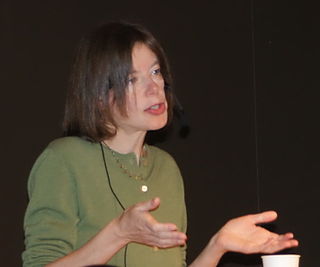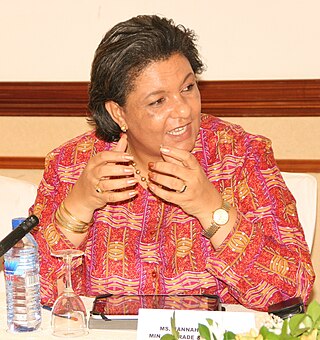
Susan Charlotte Faludi is an American feminist, journalist, and author. She won a Pulitzer Prize for Explanatory Journalism in 1991, for a report on the leveraged buyout of Safeway Stores, Inc., a report that the Pulitzer Prize committee commended for depicting the "human costs of high finance". She was also awarded the Kirkus Prize in 2016 for In the Darkroom, which was also a finalist for the 2017 Pulitzer Prize in biography.
The Mexico City policy, sometimes referred to by its critics as the global gag rule, is a former United States government policy that blocked U.S. federal funding for non-governmental organizations (NGOs) that provided abortion counseling or referrals, advocated to decriminalize abortion, or expanded abortion services. When in effect, the Mexico City policy is a U.S. government policy that requires foreign non-governmental organizations to certify that they will not "perform or actively promote abortion as a method of family planning" with non-U.S. funds as a condition for receiving U.S. global family planning assistance, and during its January 23, 2017 implementation any other U.S. global health assistance, including U.S. global HIV and maternal and child health (MCH) assistance.

Third-wave feminism is a feminist movement that began in the early 1990s, prominent in the decades prior to the fourth wave. Grounded in the civil-rights advances of the second wave, Gen X third-wave feminists born in the 1960s and 1970s embraced diversity and individualism in women, and sought to redefine what it meant to be a feminist. The third wave saw the emergence of new feminist currents and theories, such as intersectionality, sex positivity, vegetarian ecofeminism, transfeminism, and postmodern feminism. According to feminist scholar Elizabeth Evans, the "confusion surrounding what constitutes third-wave feminism is in some respects its defining feature."
The term postfeminism is used to describe reactions against contradictions and absences in feminism, especially second-wave feminism and third-wave feminism. The term postfeminism is sometimes confused with subsequent feminisms such as fourth-wave feminism and xenofeminism.
Standpoint theory, or standpoint epistemology, is a theory for analyzing inter-subjective discourses. Standpoint theory proposes that authority is rooted in individuals’ personal knowledge and perspectives and the power that such authority exerts.
Antifeminism, also spelled anti-feminism, is opposition to feminism. In the late 19th century and early 20th century, antifeminists opposed particular policy proposals for women's rights, such as the right to vote, educational opportunities, property rights, and access to birth control. In the mid and late 20th century, antifeminists often opposed the abortion-rights movement and, in the United States, the Equal Rights Amendment.

Backlash: The Undeclared War Against American Women is a 1991 book by Susan Faludi, in which the author presents evidence demonstrating the existence of a media-driven "backlash" against the feminist advances of the 1970s in the United States.

Jennifer Baumgardner is a writer, activist, filmmaker, and lecturer whose work explores abortion, sex, bisexuality, rape, single parenthood, and women's power. From 2013 to 2017, she served as the Executive Director/Publisher at The Feminist Press at the City University of New York (CUNY), a feminist institution founded by Florence Howe in 1970.
Reproductive justice is a critical feminist framework that was invented as a response to United States reproductive politics. The three core values of reproductive justice are the right to have a child, the right to not have a child, and the right to parent a child or children in safe and healthy environments. The framework moves women's reproductive rights past a legal and political debate to incorporate the economic, social, and health factors that impact women's reproductive choices and decision-making ability.

The status of women in Ghana and their roles in Ghanaian society has changed over the past few decades. There has been a slow increase in the political participation of Ghanaian women throughout history. Women are given equal rights under the Constitution of Ghana, yet disparities in education, employment, and health for women remain prevalent. Additionally, women have much less access to resources than men in Ghana do. Ghanaian women in rural and urban areas face slightly different challenges. Throughout Ghana, female-headed households are increasing.
Live Action is an American nonprofit anti-abortion organization founded by Lila Rose. The organization is known for its undercover videos taken at Planned Parenthood. Live Action seeks to outlaw abortion nationwide, and deny federal and state funding to Planned Parenthood.
"War on women" is a slogan in United States politics used to describe certain Republican Party policies and legislation as a wide-scale effort to restrict women's rights, especially reproductive rights, including abortion. Prominent Democrats such as Nancy Pelosi and Barbara Boxer, as well as feminists, have used the phrase to criticize proponents of these laws as trying to force their social views on women through legislation. The slogan has been used to describe Republican policies in areas such as access to reproductive health services, particularly birth control and abortion services; the definition of rape for the purpose of the public funding of abortion; the prosecution of criminal violence against women; and workplace discrimination against women.

The personal is political, also termed The private is political, is a political argument used as a rallying slogan of student movement and second-wave feminism from the late 1960s. In the context of the feminist movement of the 1960s and 1970s, it was a challenge to the nuclear family and family values. The phrase was popularized by the publication of a 1969 essay by feminist Carol Hanisch under the title "The Personal Is Political" in 1970, and has been repeatedly described as a defining characterization of second-wave feminism, radical feminism, women's studies, or feminism in general. It has also been used by some women artists as the underlying philosophy for their art practice.

Gender inequality in Mexico refers to disparate freedoms in health, education, and economic and political abilities between men and women in Mexico. It has been diminishing throughout history, but continues to persist in many forms including the disparity in women's political representation and participation, the gender pay gap, and high rates of domestic violence and femicide. As of 2022, the World Economic Forum ranks Mexico 31st in terms of gender equality out of 146 countries. Structural gender inequality is relatively homogeneous between the Mexican states as there are very few regional differences in the inequalities present.
Hashtag activism refers to the use of Twitter's hashtags for Internet activism. The hashtag has become one of the many ways that social media contributes to civic engagement and social movements. The use of the hashtag on social media provides users with an opportunity to share information and opinions about social issues in a way that others (followers) can interact and engage as part of a larger conversation with the potential to create change. The hashtag itself consists of a word or phrase that is connected to a social or political issue, and fosters a place where discourse can occur. Social media provides an important platform for historically marginalized populations. Through the use of hashtags these groups are able to communicate, mobilize, and advocate for issues less visible to the mainstream.
Communist and Marxist ideologies generally allow state-provided abortion, although there is no consensus among Communist parties and governments about how far into the pregnancy abortion should be allowed.

Abortion in Kenya is prohibited with the exception of certain circumstances including danger to the life and health of the expectant mother, and rape. Unsafe abortions are a major cause of deaths and health complications for women in Kenya.
Abortion in Utah is legally performed under a temporary restraining order blocking enforcement of the state's trigger law, which bans abortion. According to HB136, which is effective state law from June 28, 2022, abortions are banned following 18 weeks of gestation. Abortion was banned following the Supreme Court case, Dobbs v. Jackson Women's Health Organization on June 24, 2022. Utah State Legislation enacted SB 174 in May 2020, which, upon the overturn of Roe v. Wade, made inducing an abortion a second-degree felony. The law includes exceptions for pregnancies "caused by rape or incest," pregnancies that put the mother's life at risk, or "if two doctors say the fetus has a lethal defect." Rape and incest exceptions will only be viable if the crimes were previously reported to law enforcement officials.
Carrie N. Baker is an American lawyer, Sylvia Dlugasch Bauman Professor of American Studies, and Chair of the Program for the Study of Women and Gender at Smith College in Northampton, Massachusetts. She teaches courses on gender, law, public policy, and feminist activism and is affiliated with the American Studies program, the archives concentration, and the public policy minor. She co-founded and is a former co-director of the certificate in Reproductive Health, Rights, and Justice Program offered by the Five College Consortium.
Joya Misra is Professor of Sociology and Public Policy, University of Massachusetts, Amherst.







